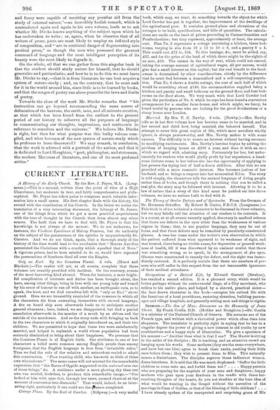Only an Earl. By the Countess Pisani. 3 vols. (Hurst
and Blackett.)—The reader will not, at all events, complain that these volumes are scantily provided with incident. On the contrary, events of the most harrowing kind abound. When, for instance, a most fright- ful complication of interests and duties has been brought about, the hero, among other things, being in love with one young lady and bound by his sense of honour to run off with another, an earthquake cuts, so to speak, the knot, and we find ourselves left with "only an Ea,1" above ground. Here we are irresistibly reminded of the romance in which all the characters die from overeating themselves with stewed lampreys. A fire on board ship soon afterwards leads us to anticipate another general clearance ; here, indeed, we are disappointed, but find a partial consolation afterwards in the murder of a monk by an abbess and the suicide of the murderess. And so the story ends with bringing us back to the two characters to which it originally introduced us, and their two children. We are permitted to hope that these two were satisfactorily married, and helped to replenish a world whose population had been seriously diminished to bring about their happiness. We presume that the Countess Pisani is of English birth. She attributes to one of her characters a belief more common among English people than among foreigners, that the English language is free from "invariable rules." Thus we find the rule of the relative and antecedent varied to admit this construction. "Poor trusting child, who knoweth so little of thine own whereabouts!" The same cause will not account for the remarkable expression that " the Baron of Oppido supported on his maternal arm one of these beings," &c. A residence under a more glowing sky than our own was needed, doubtless, to produce this remarkable image,—" She looked at him with eyes that, through her tears, seemed charcoal at the moment of conversion into diamonds." That would, indeed, be an inter- esting sight, particularly if one could see the it'ocess completed.






























 Previous page
Previous page